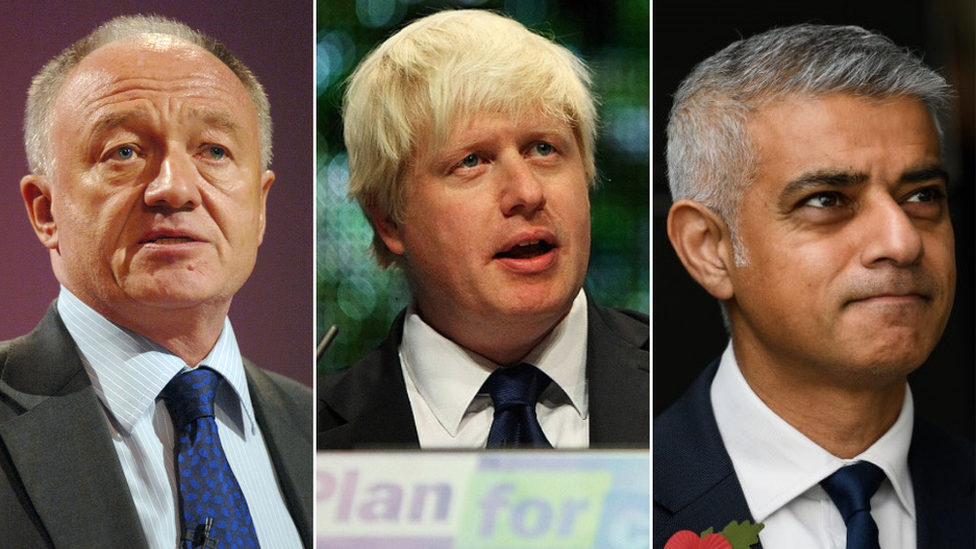Boris Johnson: Did his time as London mayor foreshadow his demise?
- Published
Boris Johnson: A look back at his political career in London
Boris Johnson has been forced to resign as prime minister. But the political position that he held for the longest before reaching Number 10 was as London mayor - another role he described as "the best job in the world".
So did his time as mayor of London foreshadow the end of his days in Downing Street?
Following a series of scandals, the final nail in the coffin for Mr Johnson as prime minister was the furore over his handling of sexual misconduct allegations against former Deputy Chief Whip Chris Pincher.
Much like his time as leader of the UK government, his years serving in London's City Hall were marred by controversies, with many lingering even after he left office after eight years in 2016.
BBC London looks at some of those events.
Handling of sexual misconduct claims
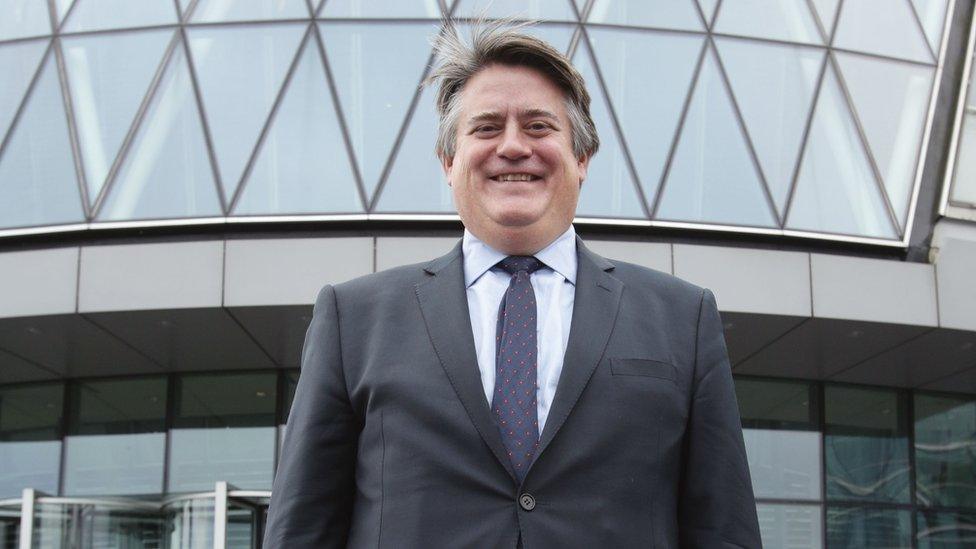
Stephen Greenhalgh outside City Hall in 2014
Almost 10 years ago, Mr Johnson faced criticism for his handling of claims about his then deputy mayor for policing Stephen Greenhalgh, who had allegedly behaved inappropriately towards a female official in a City Hall lift.
Although Mr Greenhalgh denied having any recollection of the November 2012 incident, he subsequently apologised. The then mayor's response was to take no further action.
Mr Greenhalgh was elevated to the House of Lords in April 2020, four months after Mr Johnson won the 2019 general election.
Lord Lebedev friendship
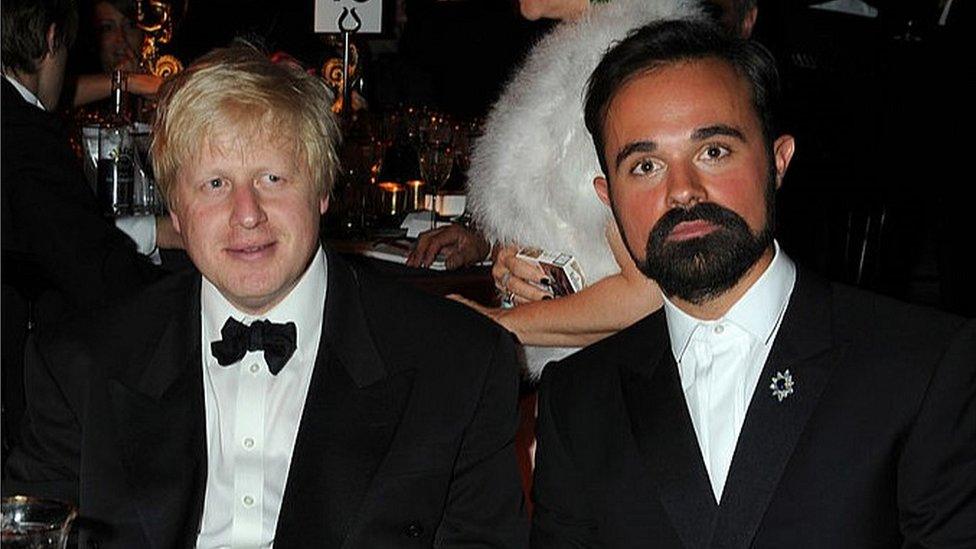
Then mayor of London Boris Johnson with Evgeny Lebedev in London in 2009
As London mayor, Boris Johnson socialised with London Evening Standard owner Evgeny Lebedev, the son of Russian oligarch and ex-KGB officer, Alexander Lebedev.
Mr Johnson told MPs this week he also met Mr Lebedev's father, without officials present, during his time as mayor. Mr Lebedev senior was also an owner of the newspaper at the time.
"I certainly have met the gentleman in question, who used to be the proprietor of the London Evening Standard when I was mayor of London," Mr Johnson said.
Mr Johnson went on to nominate his long-time friend Evgeny Lebedev to become a member of the House of Lords in July 2020, against the advice of the intelligence services who warned the prime minister that it posed a national security risk, the Sunday Times alleged., external
The paper said the commission that vets peerage appointments had advised against granting Mr Lebedev a seat on security grounds, but that assessment was withdrawn after Mr Johnson personally intervened. Lord Lebedev denies he is a security risk to the UK.
Bridge to nowhere
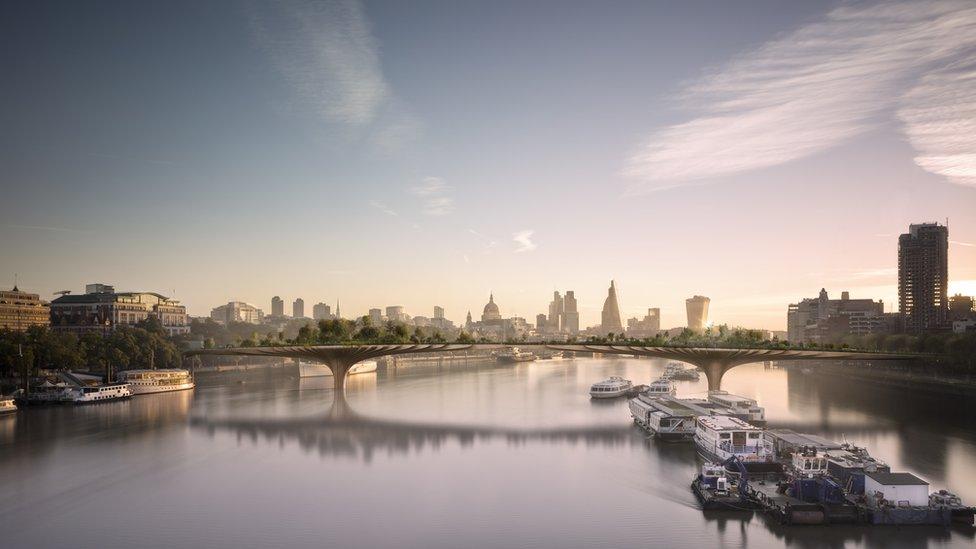
The Garden Bridge was never built but still cost £53.5m
While in City Hall, Mr Johnson had a particular fondness for grand monuments. There was the twisting red steel of the ArcelorMittal Orbit sculpture in east London, or the swaying - and often empty - cabs of the Emirates Cable Car.
But it was a project that never got off the ground that would prove particularly costly.
The Garden Bridge was first mooted in 1998 as a floating memorial to Princess Diana. The plans picked up momentum in 2012, with Mr Johnson among those who backed a new tree-covered crossing to span the River Thames between Temple and the South Bank.
Five years later, the bridge project was killed off by his successor Sadiq Khan following numerous issues with funding and a lack of support from some residents - yet not before £53.5m had been spent on it.
Mr Johnson, by now foreign secretary, was ordered back to his former workplace in March 2018 to give an explanation. But he remained defiant, claiming he had wasted "not a single penny of taxpayers' money", and his only regret was the fact the project was not completed before he left office.
Loose cannon
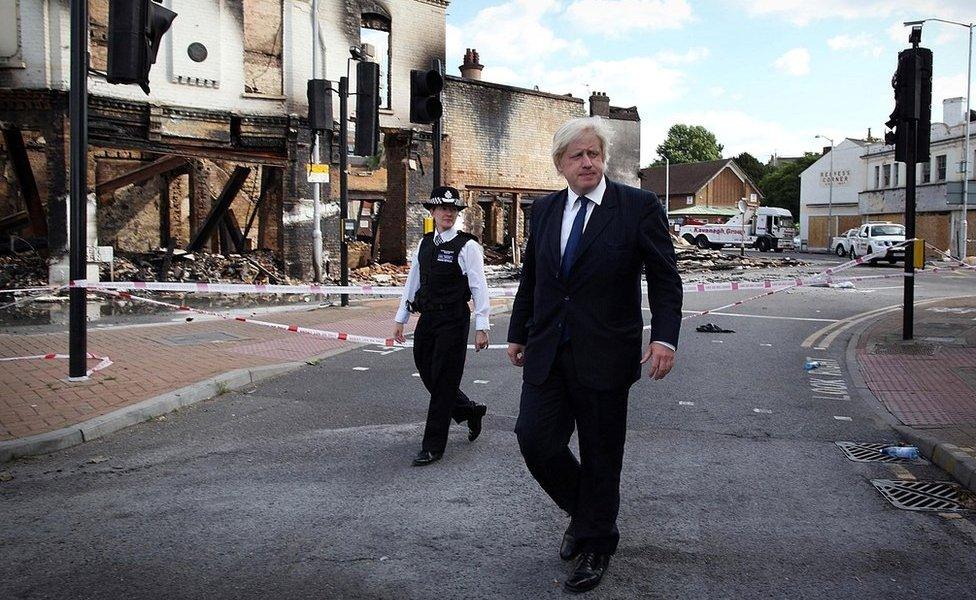
The then mayor of London was on holiday when the 2011 riots began
One idea that Mr Johnson did manage to get off the ground was the purchase of three water cannon.
The mayor was on holiday when the London riots broke out in summer 2011 but, after much criticism from Londoners and the media, he cut his trip short and returned home.
Partly as a response, Mr Johnson wrote to then Home Secretary Theresa May, outlining his plans to equip the Met Police with three water cannon as crowd-control devices and, in June 2014, three second-hand vehicles were bought from Germany and refurbished at a cost of more than £320,000.
This included £970 to fit them out with radios and CD players.
However, the following month Mrs May announced that their operational use would not be authorised and the unused water cannon were hidden away before finally being sold for scrap for £11,025 in 2018, with Mr Khan triumphally declaring: "We have managed to finally get rid of them."
Bikes & bendy buses
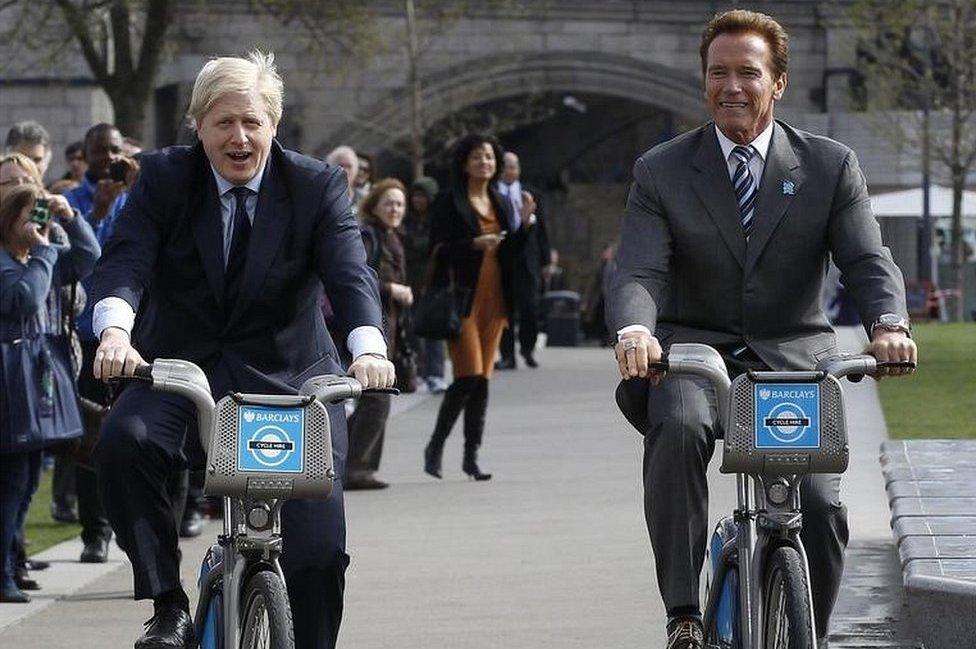
Even actor-turned-politician Arnold Schwarzenegger has been for a ride on a so-called Boris bike
Possibly Mr Johnson's most famous legacy is the capital's cycle hire scheme - the term "Boris bikes" is still used by some - as ridership levels continue to climb.
It had been originally hoped to have the entire scheme paid for privately, but public subsidies were required and it was actually the previous mayor, Ken Livingstone, who first suggested the project.
Another introduction to London's transport network was the New Routemaster bus, which harked back to the golden days of the AEC Routemaster and had been used as a nostalgia-driven ploy during Mr Johnson's 2008 election campaign.
To fulfil an election pledge, he also banished London's "bendy buses", which were seen as too big for the capital's streets, dangerous for cyclists and a boon for fare-dodgers.
In 2012, London got its first New Routemaster buses, complete with conductors and a rear hop-on, hop-off platform.
While the buses may be distinctive and sleek, they also proved to be costly; there were problems with their hybrid engines, and a lack of windows meant the interiors could get very sweaty. Some £2m would later be spent retro-fitting them with opening windows.
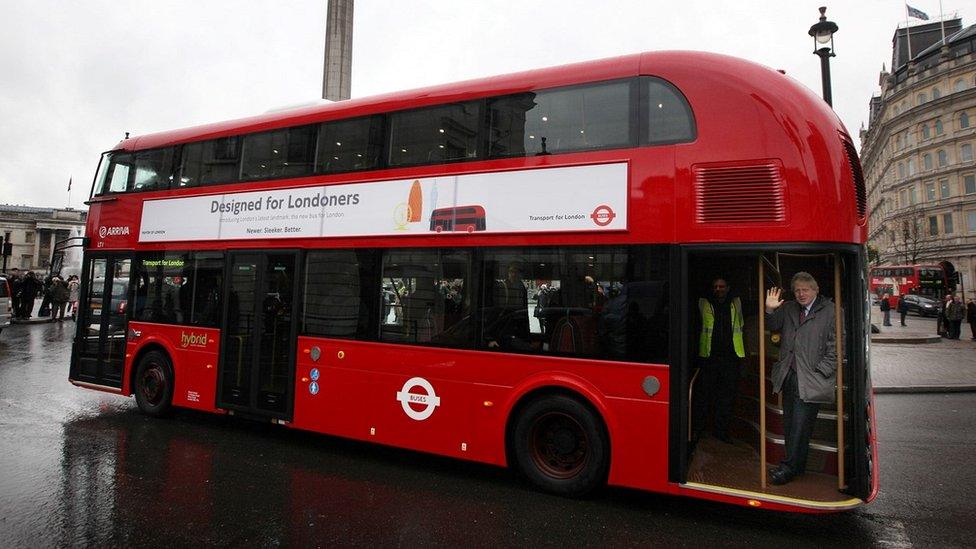
Transport for London spent £350m on 1,000 New Routemaster buses
The current mayor has proved to not be a big fan, ending orders for any new ones and earlier this year warning that the vehicles might have to be removed from the roads if funds for their mid-life refurbishment cannot be found.
The 2008 election campaign also saw Mr Johnson promise to keep Tube ticket offices staffed and open. They were all closed five years later.
Costly cable cars
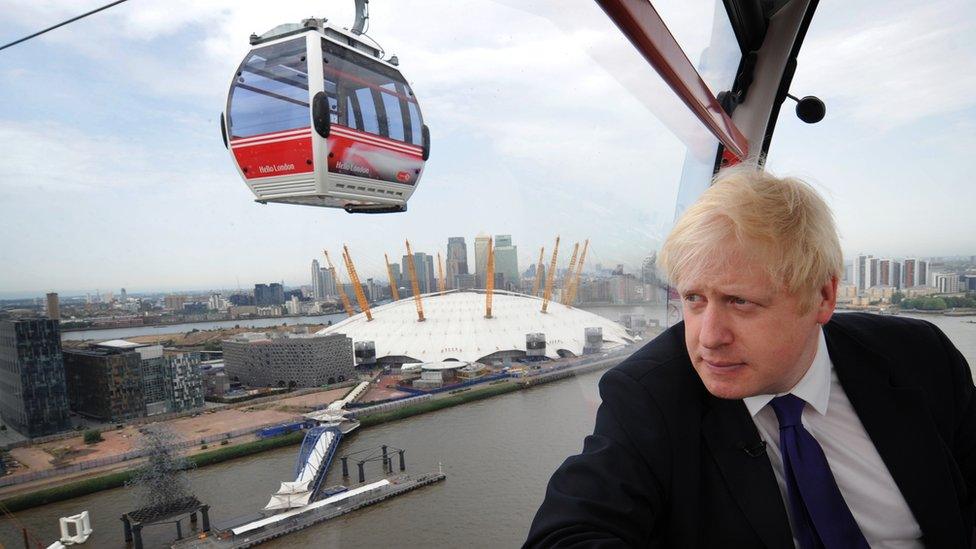
London's cable car has been underused since the 2012 Olympics, figures show
As previously mentioned, the London Cable Car was another introduction to the transport system during Mr Johnson's mayoral tenure, linking the O2 Arena with the ExCel centre.
Currently without a sponsor after a 10-year deal with Emirates ran out, the project was originally expected to cost £25m but this figure rose to £63m. Some £20m of that was public money.
The route was a useful link between two 2012 Olympic Games venues in east London, but Mr Johnson claimed Londoners would continue flocking to it, with the service being "as good as a bus route with 30 buses on it" and having the ability to carry 2,500 people an hour.
A year after the Games, it was revealed only four commuters were regularly using the cable car.
'Boris Island'
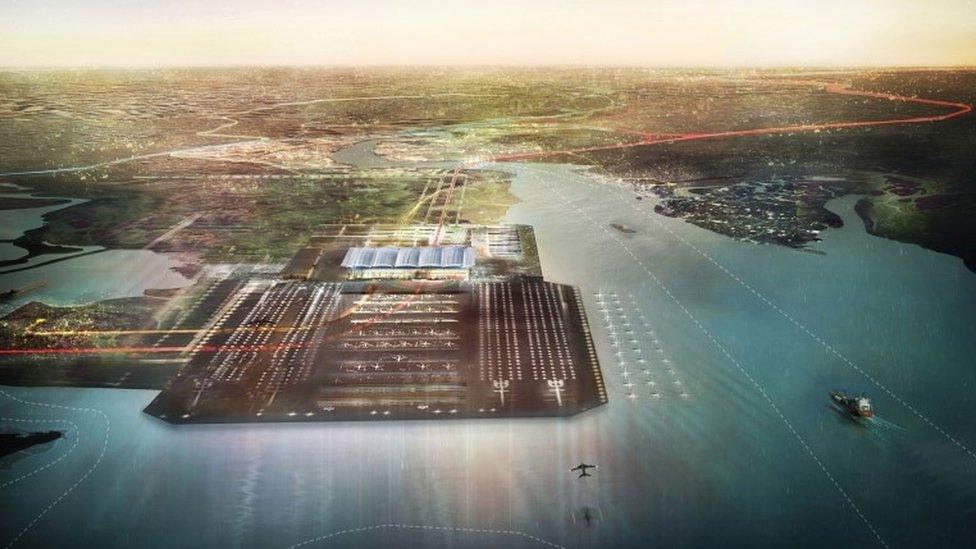
The four-runway project was rejected as an idea by the Airports Commission
An opponent of expanding Heathrow Airport, Mr Johnson backed building an alternative in the Thames Estuary.
Dubbed "Boris Island", it was rejected by the Airports Commission as being hugely costly, economically unviable and damaging to the environment.
When in June 2018 there was a Commons vote on building a third runway at Heathrow, Foreign Secretary Mr Johnson missed the session, having travelled to Afghanistan. Cries of "where's Boris?" could be heard from MPs on the Labour benches.
The greatest show on Earth
The year 2012 saw the then mayor not only dangling from a zipwire at Victoria Park in Stratford, east London, but also leading the capital through the build-up to the London Olympics and then the event itself.
This period saw Mr Johnson successfully sell both himself and the capital on a world stage. It was seen as a major boost for the city, although it was his predecessor Mr Livingstone who put in the work bidding for the capital to become host.
Stratford witnessed a major transformation in the build-up to the Games and continues to do so with a cultural, academic and sporting hub being developed.
Yet there was controversy about what happened to the 60,000-seater stadium that was the centrepiece of the Games.
West Ham United moved into the newly renamed London Stadium in 2016, not long after it had emerged the club was paying £2.5m a year in rent, a figure described as "ludicrously generous".
But the deal won support in some quarters for preventing the venue from becoming a white elephant, as had happened with other purpose-built Olympic arenas.
The trouble with Jennifer
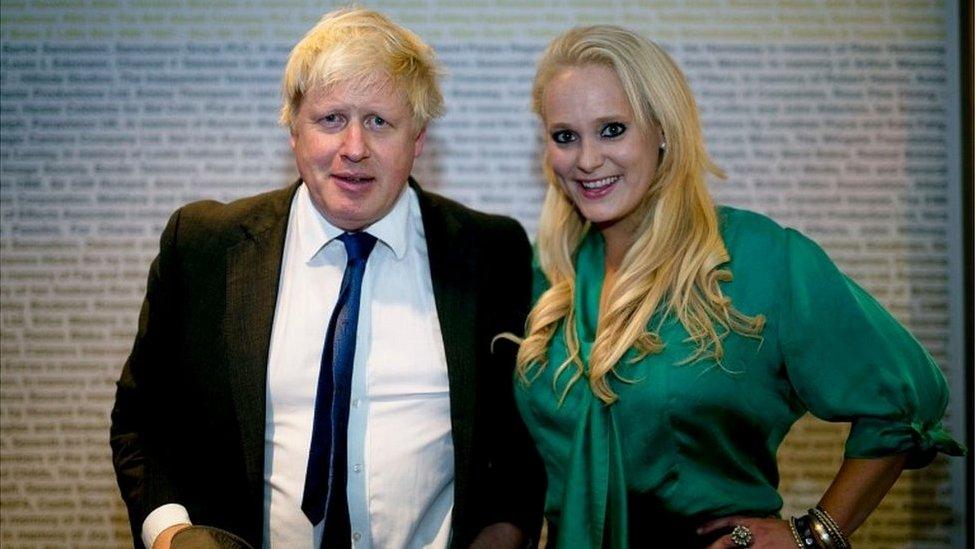
Jennifer Arcuri has claimed she and Mr Johnson had an intimate relationship
The name Jennifer Arcuri was little known while Mr Johnson was mayor, but the US businesswoman has come to haunt him since.
In 2019, a Sunday Times investigation, external revealed the technology entrepreneur had joined the then mayor on overseas trade missions in 2014 and 2015, and one of her businesses had received funds from a mayoral organisation while Mr Johnson was in City Hall, as well as a government grant.
Since then Ms Arcuri has claimed she had an intimate relationship with Mr Johnson when he was mayor, raising questions about conflicts of interest.
The Independent Office for Police Conduct investigated and found that while there was "some evidence" the pair had a relationship, there was no indication Mr Johnson had influenced payments to her or her companies and there was no need for a criminal investigation.
Mr Johnson, no stranger to accusations of adultery, has always denied any wrongdoing, saying he acted with "honesty and integrity" in his dealings with Ms Arcuri.

Boris Johnson resignation
WHAT NOW? How a new leader is elected
Watch: Boris Johnson: A career in moments

Follow BBC London on Facebook, external, Twitter , externaland Instagram, external. Send your story ideas to hellobbclondon@bbc.co.uk, external
- Published7 July 2022
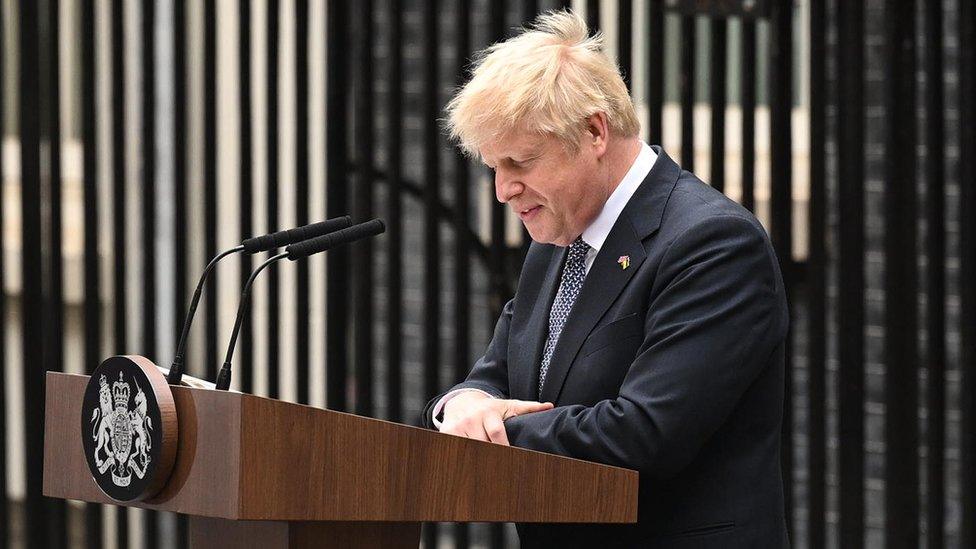
- Published15 June 2023
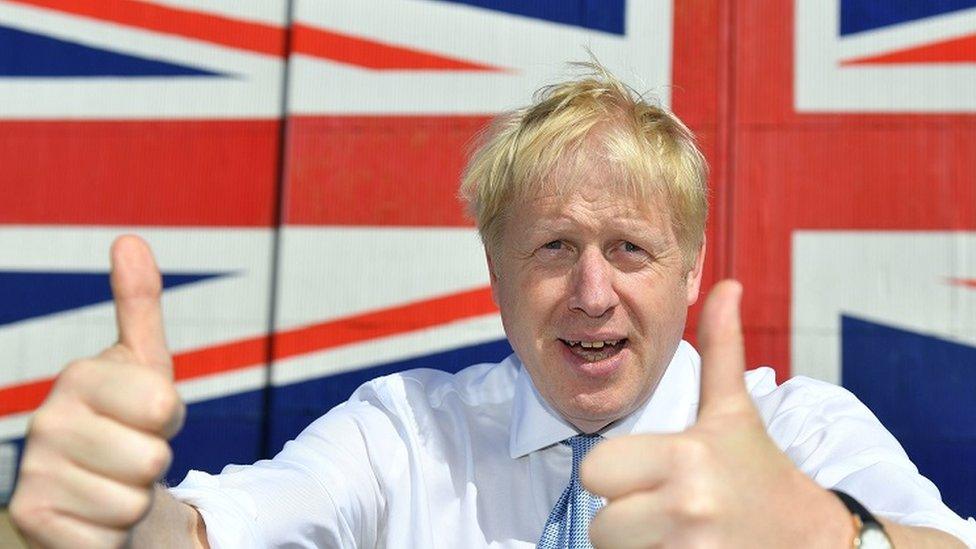
- Published24 October 2022
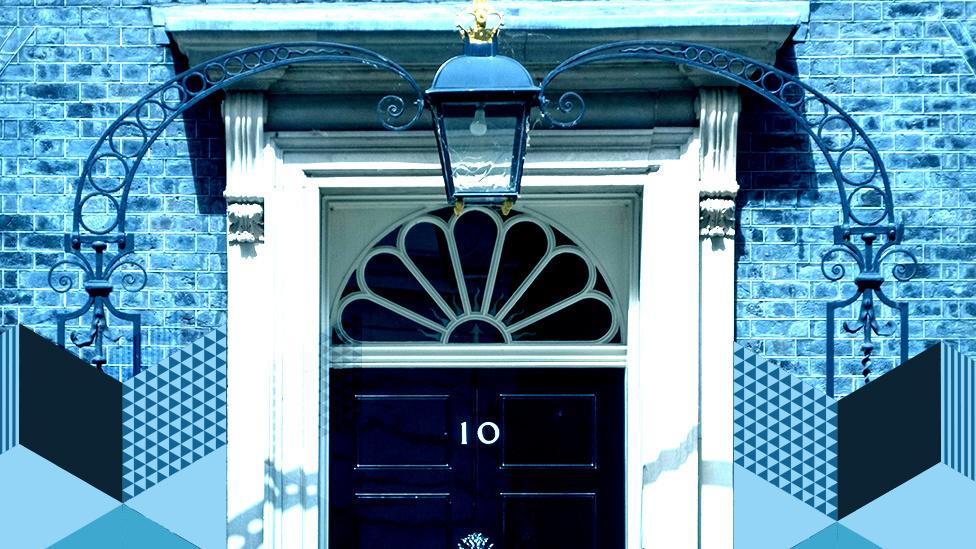
- Published7 July 2022
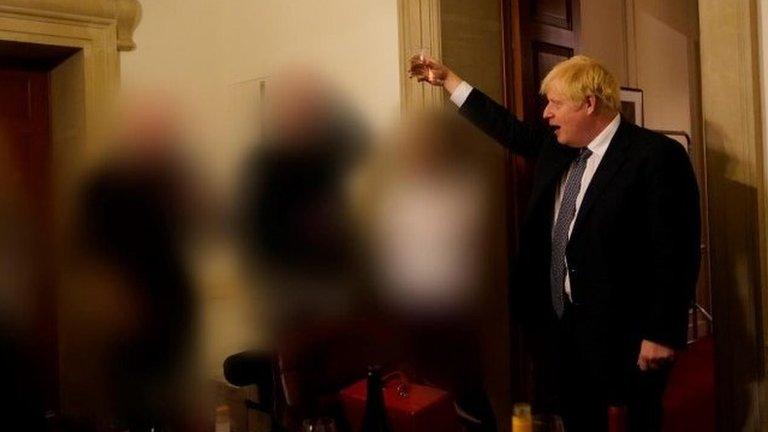
- Published31 March 2021
